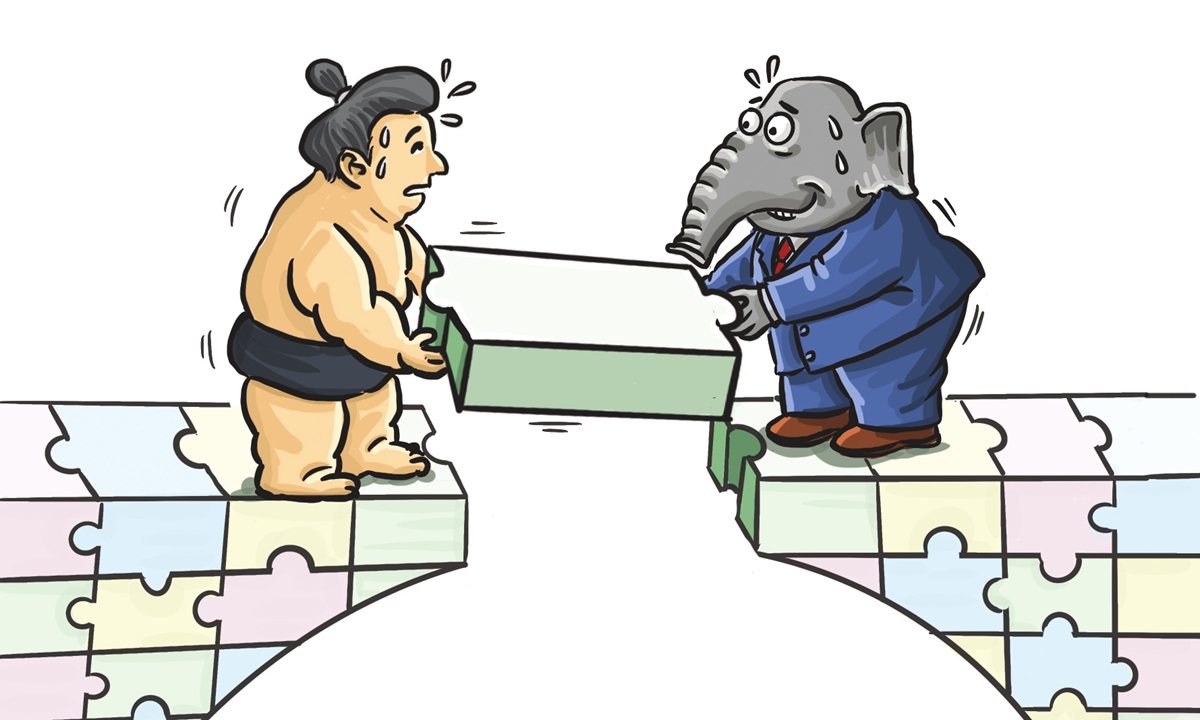India, Japan cooperation shouldn't aim to contain Beijing
By Tian Guangqiang Source: Global Times Published: 2020/9/7 19:58:01

Illustration: Xia Qing/GT
Despite Japanese Prime Minister Shinzo Abe's sudden resignation, the Indo-Japanese summit proposed for September is likely to go ahead as planned. The importance the two countries clearly attach to the meeting shows their eagerness to accelerate cooperation despite the spread of coronavirus pandemic.
The Indo-Japanese summit has several aims relating to both strategy and the economy. When it comes to strategy, the two countries expect to deepen military cooperation and promote the QUAD (Quadrilateral Security Dialogue), which is actually an anti-China forum. The summit also aims to increase economic cooperation between the two countries to reduce their economic ties with China.
The Modi government is embracing unbridled populism and nationalism. Provocations by the Indian troops at the border caused a deadly clash with China back in June. China remains restrained, but it is clear India's aggressive unilateral actions threaten the stability of the region.
Although China-Japan relations are relatively stable, disputes over the Diaoyu Islands and other issues often crop up, creating obstacles to bilateral ties.
Responding to the Trump administration's toughening stance toward China, India and Japan are strengthening military cooperation to keep an eye on rapidly growing China.
The Modi government's economic policies and the impact of the coronavirus pandemic have left India's economy in deep distress - the cause of much unhappiness at home. Under the dual functions of rising protectionism and the pandemic, Japan's economy, dependent on foreign trade, also faces mounting challenges. In this regard, it's clear to see why Japan and India hope to promote the recovery of their economies by deepening economic links. Meanwhile, the two countries are trying to cut their economic ties with China.
India and Japan have both enacted restrictions on Chinese investments and tried to move industrial chains out of China. As China's labor costs rises and competition between the Chinese and Japanese economies intensifies, Japan seems to accelerate its manufacturing plants from China to India.
In areas such as the digital economy and infrastructure, India and Japan will deepen their cooperation in a bid to squeeze China's position in global economy. Japan and India will no doubt cooperate with the US to establish a regional cooperation mechanism that will exclude China.
However, the cooperation between India and Japan still faces many obstacles, making it difficult to see how the path will be a smooth one.
For starters, India's own lack of strength will limit the depth of its cooperation with Japan. Although India is among the world's fastest growing economies, its defense and military strength remains limited, which will hinder deeper cooperation with Japan. The huge gap between the two countries in terms of military equipment, military strategy and military concepts will also make it difficult for the two sides to deepen cooperation in the area, and India's backward investment environment won't encourage Japanese investors either.
Secondly, any attempts to deepen cooperation between India and Japan will be deeply influenced by the US' political posturing. As the US' most important partners in the Indo-Pacific region, cooperation between Japan and India will be welcomed by the US, but the Trump Administration will angle for any such cooperation to be carried out within a framework dictated by Washington. Any US-led policy will inevitably hinder such a cooperation.
And lastly, both India and Japan in general desire a good relationship with China, rather than the complete severance of their economic ties. Although Japan and India have strengthened their precautions against China, neither country can bear the results of a complete deterioration of relations. China is one of Japan and India's largest economic partners, and the recovery and development of the two Asian economies needs better cooperation with China. Although both Japan and India want to reduce their economic ties with China, neither side will be able to effectively decouple from the Chinese economy.
The author is an assistant research fellow with the National Institute of International Strategy at the Chinese Academy of Social Sciences. bizopinion@globaltimes.com.cn
Posted in: EXPERT ASSESSMENT